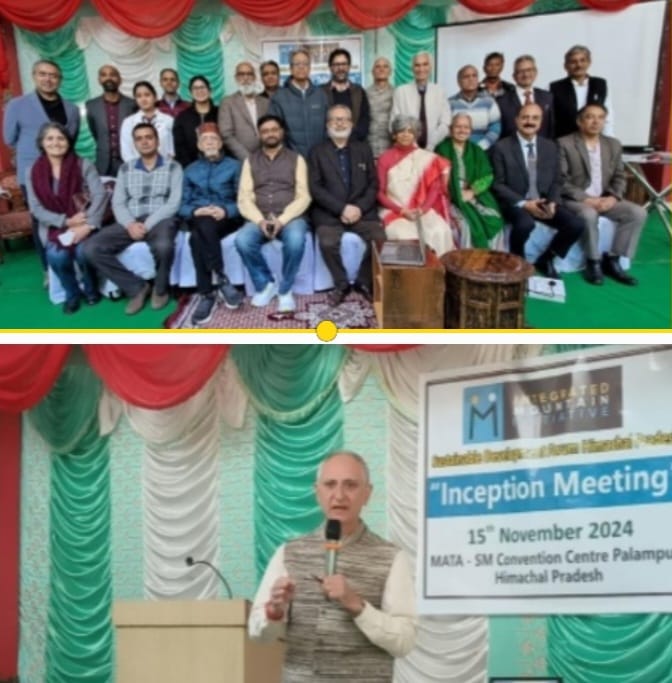Palampur, Nov 15: Sustainable development in Himachal Pradesh will revolve around its natural wealth—water, forests, and an equity-driven tourism model.
This vision took center stage at an inception meeting organized by the Integrated Mountain Initiative (IMI) and its newly formed Himachal Pradesh Chapter, the Sustainable Development Forum of Himachal Pradesh (SDFHP) at the MATA-SM Convention Centre here today.
Supported by the local NGO Palampur Welfare and Environment Protection Forum, the meeting brought together experts, policymakers, and environmental advocates to tackle Himachal’s pressing environmental challenges.
The discussions aimed to address three critical questions.
These aimed at identifying the state's key environmental issues, proposing actionable solutions from the state to the Panchayat level, and developing strategies to influence national policies for the sustainable development of the Indian Himalayan region.
Dr. Rajan Kotru, a leading advocate for Himalayan conservation and President SDFHP, opened the dialogue by emphasizing the importance of natural capital in driving Himachal’s economy.
He said that the state’s future hinges on conservation-focused development, asserting that safeguarding forests and water resources is crucial for economic growth.
Building on this, Dr M.P. Sood, a former bureaucrat and SDFHP secretary, urged collective action.
He described SDFHP as a platform for anyone committed to preserving Himachal for future generations, inviting participants to join forces to bring meaningful change. Meanwhile,
IMI President Ramesh Negi(former chief secretary, Arunachal Pradesh) expressed concern over the lack of attention given to sustainable development in the Himalayas.
Negi stressed the need to shift priorities, pointing out that while the Himalayas are celebrated for their beauty, their developmental needs remain overlooked.
The discussions that followed identified the water crisis, waste management, and unsustainable tourism practices as the state’s most pressing issues.
They proposed solutions to the water crisis included statewide awareness campaigns, Panchayat-level rainwater harvesting projects, and the revival of traditional water systems.
On waste management, participants stressed the importance of engaging the youth in responsible waste practices, supported by robust information, education, and communication initiatives.
The focus on tourism emphasized creating equitable systems that uplift local communities.
The hospitality sector, participants suggested, must adopt sustainability models that not only boost businesses but also preserve the environment and benefit the local population.
The meeting concluded with a unanimous agreement on the need for a collective, multi-layered strategy to sustain this dialogue and translate it into tangible actions.
“This isn’t a one-off discussion. The aim is to build a strong advocacy framework to push for policy and investment tailored to Himachal’s unique needs,” Dr. Kotru stated.
The call for action was clear: rethink, reform, and revive Himachal’s development trajectory, ensuring its "ecological sanctity remains intact while paving the way for a sustainable future".








